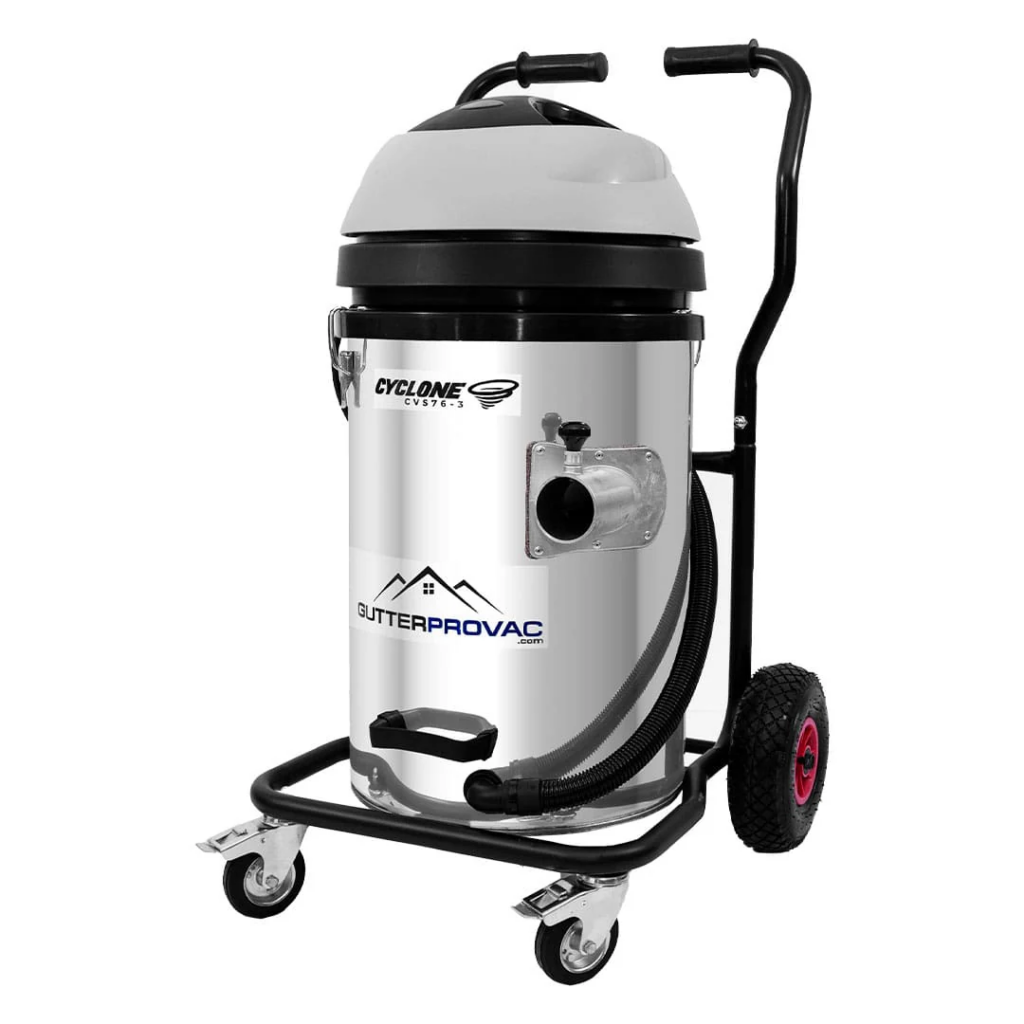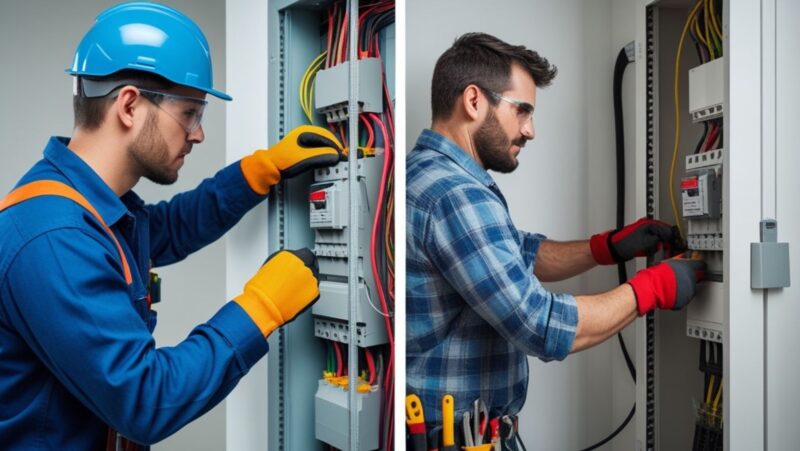
Nobody enjoys cleaning gutters manually – it’s just one of those things you need tools for to stay sane. Like gutter vacuums. If you’re a property owner looking into these, you’ll quickly face a choice between commercial and residential models.
Industry veterans have seen countless frustrated buyers who chose the wrong type, leading to expensive mistakes and wasted time. Before you pull out your wallet, it’s worth understanding what makes each one unique and which tools to clean gutters with.
Power and Performance
When it comes to gutter vacuums, power isn’t just about raw numbers – it’s about how it is delivered and used. Most residential units operate with single or dual-motor setups, providing enough suction for typical household maintenance.
Commercial units often feature additional motors, but here’s something many suppliers won’t tell you: more motors don’t always mean better cleaning. What matters is the overall system design, how the suction is distributed, and most importantly, how the power matches your specific needs.
The real difference often shows up in how these machines handle continuous operation. Commercial units are built for longer running times and typically include features like advanced cooling systems or motor protection.
For a homeowner doing seasonal cleaning, this might not matter much. But for someone cleaning multiple properties daily, these features become crucial for long-term reliability.
Pro Tip: Don’t get caught up in the numbers game. A well-designed 2000W system can often outperform a poorly made 3000W unit. Look for reviews mentioning real-world performance rather than just specs.
Tank Design and Construction
Here’s something that might surprise you – tank size isn’t as varied between commercial and residential models as you might think. Most quality units, regardless of their intended use, offer similar capacities ranging from 15 to 20 gallons.
The key differences lie in construction materials and emptying mechanisms.
Modern materials have revolutionized how these machines are built. High-grade polymers used in residential units offer excellent quality while keeping weight manageable. Commercial units often use metal construction, which promises amazing durability.
It’s all about matching the material to your usage pattern.
Power Requirements: The Game Changer
This is where the rubber meets the road, and it’s often the factor that makes the final decision for many buyers.
Most residential gutter vacuums run on standard household power, typically 120V outlets. Commercial units might require specialized power setups or generators, which completely changes the operational equation.
For business owners, this extra power requirement might make sense – especially when the increased capability translates to faster job completion.
But for homeowners, the convenience of plug-and-play operation often outweighs any potential performance benefits of commercial units.
Essential Knowledge: If you’re considering a commercial unit, remember that generator costs aren’t just about the initial purchase. Factor in fuel, maintenance, and the extra time needed for setup and teardown.
Filtration and Debris Management
Both types of vacuums need to handle wet and dry debris effectively, but they approach this challenge differently.

Residential units often feature HEPA filtration, which is great for preventing fine dust from becoming airborne – particularly important when working near living spaces.
Commercial units might use simpler but more easily maintained filter systems, designed for quick cleaning between jobs.
The key is understanding what you’ll be cleaning most often. Wet leaves and debris require different filtration considerations than dry material. Some systems handle both equally well, while others might excel at one but struggle with the other.
A Market Comparison: Real-World Examples
To illustrate these differences, let’s look at two popular models currently available:
Residential Example (Cyclone 2400W):
- Dual 1200W motors (2400W total)
- Standard 120V power requirement
- 20-gallon polypropylene tank
- 16-foot hose and 28-foot cord
- HEPA filtration
- Bypass cooling system
- 61.5-pound weight
Commercial Example (20 Gallon Classic):
- Triple 1200W motors (3600W total)
- Generator required (6500W peak minimum)
- 20-gallon stainless steel tank
- 20-foot hose and 35-foot cord
- Washable cloth filter
- Tipping chassis design
- 72 pound weight
Making an Informed Choice
The decision between commercial and residential models shouldn’t be about which is “better” – it’s about which is better for your specific situation.
Consider:
- Usage Frequency: How often will you actually use the vacuum?
- Property Type: Single home or multiple properties?
- Power Availability: Do you have access to necessary power sources?
- Storage Space: Where will you keep the unit and any required accessories?
- Budget: Remember to factor in all costs, not just the purchase price
Smart Tip: Consider seasonal usage patterns. A residential unit that’s perfect in summer might struggle with wet fall leaves. Plan for your most challenging cleaning scenarios.
Maintenance Considerations
Regular maintenance is crucial for both types, but the approach differs.

Residential units typically need:
- Regular filter cleaning or replacement
- Hose inspection and cleaning
- Motor cooling system checks
- Power cord integrity checks
Commercial units might require:
- More frequent filter maintenance
- Generator maintenance (if applicable)
- More robust cleaning between jobs
- Regular inspection of metal components for corrosion
Maintenance Tip: Keep spare filters on hand regardless of which type you choose. A clogged filter can cut suction power in half, turning a quick job into an all-day affair.
Cost Analysis: Beyond the Price Tag
Initial purchase price is just one part of the equation.
Consider these long-term factors:
- Operating costs (electricity vs. generator fuel)
- Maintenance supplies and replacement parts
- Additional equipment needs (generators, special attachments)
- Time efficiency and labor costs
- Expected lifespan of the equipment
Both commercial and residential gutter vacuums have their place in the market. The key is matching the tool to your specific needs rather than getting caught up in the “commercial must be better” mentality.

For most homeowners, a quality residential unit will provide years of reliable service. Business owners might benefit from commercial features, but only if their operation can justify the additional complexity and cost.
Choose based on these factors rather than marketing hype, and you’ll end up with a tool that serves you well for years to come.
Parting Tip: Whatever you choose, invest in good safety equipment. The best gutter vacuum in the world won’t help if a piece of gutter debris accidentally falls on your head.
Frequently Asked Questions
Q: Can I use a gutter vacuum in winter or freezing conditions?
A: While gutter vacuums can be used in cold weather, it’s not recommended when temperatures are below freezing. Ice and frozen debris can damage the vacuum’s components, and the hoses become less flexible in extreme cold. Best to plan your cleaning for days above freezing.
Q: How noisy are gutter vacuums compared to regular vacuum cleaners?
A: Gutter vacuums typically operate at 70-85 decibels, about the same as a dishwasher. Commercial models, especially when paired with generators, can be significantly louder. If noise is a concern, consider scheduling work during mid-day hours and checking local noise ordinances.












